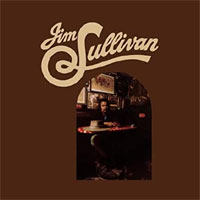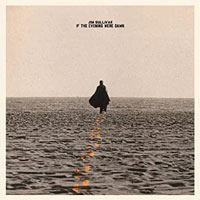Jim Sullivan • Jim Sullivan
Jim Sullivan • If the Evening Were Dawn
f director Quentin Tarantino is ever looking for a thematic sequel to Once Upon a Time...in Hollywood, his wistful homage to 1960s-era cinema, the quirky life of obscure folk singer/songwriter Jim Sullivan certainly deserves a pitch. While making friends with movie stars like Lee Marvin and Harry Dean Stanton and landing a spot as an extra in Easy Rider, the long-haired, linebacker-sized Sullivan doggedly worked the LA club circuit night after night. His heartfelt performances were so compelling that a group of well-heeled admirers paid studio musicians from LA’s famous Wrecking Crew to help produce his 1969 debut album called U.F.O. In spite of enthusiastic crowds and sold-out shows, Sullivan never made headway on the charts, due in some part to his decision to sign with Hugh Hefner’s controversial and struggling Playboy Records label. In a last-gasp attempt to hit the big time, Sullivan decided to try his hand at writing songs in Nashville. On his way there in 1975, he checked into a New Mexico hotel where he simply disappeared without a trace, leaving a box full of promotional records and his beloved guitar in an abandoned VW beetle on the side of a dirt road. Cue credits. That mixture of X-Files mystery and pulp-fiction flavor surrounding Sullivan’s life is part of what makes Light in the Attic’s new reissue of his second record and a collection of previously unreleased demo tracks such a fascinating and addictive pleasure. For those who are already fans of Light in the Attic’s 2010 reissue of U.F.O., these two albums offer an even deeper dive into Sullivan’s slightly off-beat but endearingly sincere style of song craft. On the self-titled 1972 sophomore album, cuts like “Sunny Jim” and “Lonesome Picker” call to mind the honeyed baritone and brooding delivery of Gordon Lightfoot. By contrast, the Jim Croce-flavored “Biblical Boogie” and cabaret-style jazz singing of “Sandman” keep the album from becoming a maudlin affair. That diversity is part of Sullivan’s appeal -- he wasn’t just a one-note folky. While his debut album’s producer, Al Dobbs, dressed up the songs with luscious strings and session-musician flourishes, Jim Sullivan is a looser and more wide-ranging session that’s garnished with brass instruments and layers of 12-string fingerpicking. Producer Jim Hughart’s approach makes the disc a fitting complement to Sullivan’s silky-smooth first release. As good as the musicianship on this album is, a number of the songs’ lyrics sound particularly dated. Lines like, “You’re just a youth seeking truth...” on the album’s opener (“Don’t Let It Throw You”) and the corny metaphors of “Tom Cat” are reminders that Sullivan was no Dylan. But neither were any number of popular singer/songwriters of the early 1970s. As I listened to the accompanying If the Evening Were Dawn, Light in the Attic’s collection of previously unreleased demos recorded live in the studio back in 1969, I was reminded of the Beatles’ famous Escher sessions. Comprised of stripped-down acoustic versions of songs from his first two albums and several compositions he’d only performed live, If Evening Were Dawn is a warm and intimate glimpse of a more relaxed Sullivan. While certainly not essential, the production’s sonics convey a raw immediacy that avid Sullivan fans should find rewarding. And now for the best news. Light in the Attic’s release of Jim Sullivan exemplifies what a serious vinyl reissue should be. As a result of Grammy-nominated audio-restoration specialist Dave Cooley’s remastering of the original analog master tapes, Sullivan’s commanding voice hovers in the room with a spooky presence. The ringing sustain of the steel strings and woody resonance of flat-top guitars as well as the burnished amber tones of brass instruments combine to provide a level of musical engagement that digital recordings rarely, if ever, manage to achieve. The 180-gram pressing by RTI is among the very quietest I’ve heard and lays perfectly flat. All of the above applies equally to If the Evening Were Dawn, and Cooley’s mastering of the demo tapes serves to provide a better sense of the recording space during those live sessions, compared to the less dimensional digital release. The packaging and artwork for both records are top notch. Produced with deluxe die-cut stock, the two gatefold sleeves contain well-designed, multi-page inserts with numerous archival photographs and well-written liner notes. If you love analog playback and are a fan of artistic
underdogs, I can’t think of a better way to spend a weekend than listening to these
two musical time capsules while pondering what might have happened if Jim Sullivan had
stuck around. |


